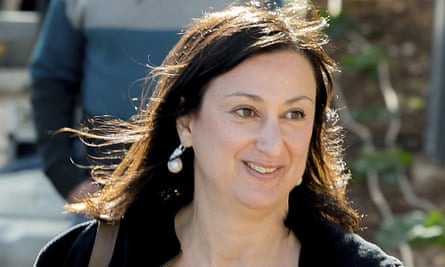The European parliament has raised “serious concerns” about democracy and the rule of law in Malta after the assassination of the high-profile investigative journalist Daphne Caruana Galizia.
In a sharply critical resolution backed by two-thirds of MEPs, the European parliament urged EU authorities to open a dialogue with Malta on the rule of law, a formal process the European commission has embarked on with Poland.
“Developments in Malta in recent years have led to serious concerns about the rule of law, democracy and fundamental rights, including freedom of the media and the independence of the police and the judiciary,” stated the text by European lawmakers, which was passed with 466 out of a possible 751 votes.
MEPs have also accused Maltese police of failing to investigate “several serious allegations of corruption and breach of anti-money laundering and banking supervision obligations”, describing this as “a threat to the rule of law in this member state”.
The resolution was passed a day after the European parliament in Strasbourg named a press room after Caruana Galizia, a mark of honour to the journalist, who was killed by a car bomb last month.
Caruana Galizia’s immediate family attended a ceremony led by the European parliament’s president, Antonio Tajani. “Daphne never grew cynical, she grew more outraged and frustrated and with every story that she broke her readership grew large and her readers more loyal,” her husband, Peter Caruana Galizia, told an audience of MEPs and journalists at the ceremony, according to the Times of Malta.
The latest resolution does not compel EU authorities to act but raises pressure on the European commission to monitor democratic standards in the EU’s smallest member state.
The EU has always struggled to police internal standards within member states, but has begun to confront democratic backsliding since the commission opened an unprecedented investigation into the rule of law in Poland. Both Poland and Hungary have also been subject to MEP resolutions, criticising Poland’s changes to its judicial system and Hungary’s treatment of asylum seekers.

In a separate resolution, MEPs on Wednesday stepped up criticism of Poland’s government over changes to its constitutional court, rebuking Warsaw for not moving to a compromise over changes it said “undermine judicial independence and weaken the rule of law in Poland”.
The commission has urged Maltese authorities to “leave no stone unturned” to find the perpetrators of the “barbarous assassination” of Caruana Galizia.
In the latest resolution MEPs also raise the alarm about the sale of Maltese passports to the super-rich, meaning that any wealthy person can buy the right to free movement and protections of EU citizenship.
Following questions from MEPs, Timmermans confirmed the European commission was investigating the “so-called sale of passports” across the EU and would publish a full report in 2018.
Malta is not the only EU member state offering wealthy individuals the right to settle for a payment. The UK grants permanent residence to people offering to invest £2m in the country under the “tier 1 investor visa” scheme. People with permanent residence can later apply for citizenship.
The issue is pertinent for Brussels as holding one EU passport confers the right to live and work in 27 other member states. “Member states should use their prerogatives with citizenship in line with their EU and international obligations,” Timmermans said.
Malta, with a population of 434,000, has a disproportionately large financial centre, where some companies have been found to pay as little as 5% corporation tax, far below the headline rate.
In the European parliament debate on Tuesday, several MEPs criticised Malta’s “hyper-low taxation”. The French Green MEP Eva Joly, vice-chair of the parliament’s special committee on the Panama papers, said tax rules in Malta had to be changed because they were “undermining European cohesion”.
Last month 20 member states signed an agreement to create a European public prosecutor’s office to tackle the most difficult cross-border crimes. Malta was among the minority that declined to take part.
The resolution was expected to pass as it had the support of groups representing almost two-thirds of MEPs, from the centre-right European People’s party to the radical left and greens.
